
« |
1 |
[ 2 ] |
3 |
4 |
»
II — Films
Since the purpose of my stay in South Korea is a closer contact with the local cinema I tried to fill my schedule mainly with Korean films, even if they would not make the most relevant titles amidst the competitive sections. On the other hand, there were opportunities to watch works from different origins and genres, and to try to have a global vision of the JIFF and its selections.
During the nine days of the festival, I saw nine features from Korea, two from Japan, two from China and seven from other countries. It was also possible to see a reasonable number of Korean shorts: five screenings, comprising a total of 26 films.
| 1. Korea |
The South-Korean productions present at the JIFF were varied, divided through several sections; from arthouse to mainstream, from good to uninteresting.
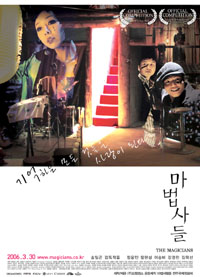 |
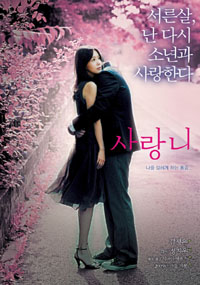 |
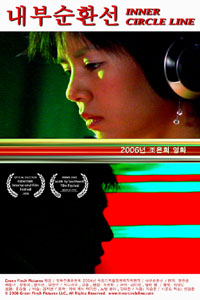 |
| Posters (from top): «Magicians», «Blossom Again» e «Inner Circle Line». |
The stronger film was Magicians (Mabeopsadeul), from Song Il-gon, the director of Git and Spider Forest (both 2004), produced as part of the Digital Short Films by Three Filmmakers project in 2005, and now edited as a feature. The term "edit" is interesting when we talk about a film which is conceived as being made on a single take.
Song and some of the cast members where present after the screening and they showed some concern with the fact that many people and critics would become entwined on the "one-take film" concept, being unable to appreciate the film by its own merits, like the story and the performances.
Magicians seduces slowly, even if it might take a while to go beyond the issue of the possible technical gimmick or trying to spot hidden cuts. The formal concept is submissive to a narrative flow which owes much to theatre and music — live performances —, with flashbacks integrated with charming minimalism, characters changing rooms, scenes and narrative time-frame, switching clothes and make-up en passant, always followed by the camera. The story follows a group of people reunited on New Year's Eve, in memory of a common friend which took her own life a few years before. The suicide had severe consequences on the way the other characters related and lead to the end of the band they had together — The Magicians.
Blossom Again (Sarang Ni), by Jeong Ji-wu (Happy End), works quite well on a technical and formal level. It's only fault, if it's fair to use such a word, is the fact that the script deals with ingredients that feel too familiar, even if they're mixed differently and the result is able to convince. A woman in her thirties gets involved with a teenager who reminds her of her first love (physically, but also has the same name). It's not easy to deal with the narrative without solving it to the reader, so let's just mention that there are a few surprises — on a fantastic level or maybe not —, which might bring reminiscences of other recent South-Korean productions. In the end, the effective direction and the work of the actors, specially Kim Jeong-eun, on the main role, will not make us feel we wasted time. The ending leaves possibilities floating around, leaving the viewer with thoughts to organise during the end credits.
There were some expectations concerning Inner Circle Line (Naemusunhwanseon), the first feature of a young director who studied in Chicago, Cho Eun-hui. Her film deals with doubts of a group of suffering characters whose paths will cross, including a girl DJ and a subway train driver, which happen to share the same name.
The director quoted influences from European auteur cinema — Kieslowski, especially The Double Life of Veronique, seems to have left a very strong mark in a number of Korean filmmakers —, but I do think there's also a bit of Taiwanese director Tsai Ming-liang, if not else in the film on a long reaction shot, which nods to Vive L'Amour. Unfortunately as with other ideas and concepts in doesn't really work. In any case, I think we can expect more interesting things from Cho Eun-hui for the future.
Don't Look Back (Nae Cheongchunegae Goham), JIFF's closing film, is another first feature, now by director Kim Yeong-nam. The closing ceremony was already sold out on the previous morning — my ID would only allow me to get tickets for the next day —, but it was possible to watch the film at a morning screening, preceding the press conference that would mark the end of the festival, with the presence of the film's director and two of its main stars.
The arthouse style of Don't Look Back is not foreign to European cinema, but the director seems to be still tied to the short-film format. Three stories which are develop without any intention of having them conclude on a conventional way in terms of narrative. Le mal de vivre x 3. I didn't know the film would be fragmented and that might not have helped my appreciation of it, due to the sudden disappearance of the characters from the first story and the minutes I took to understand they wouldn't return.
Heavenly Path (Cheongsangkowon), the only Korean film included on the section Digital Spectrum, follows a man in search of his girl friend who travelled to the Himalayas a few years ago. Cross between road movie and documentary, with a very simple structure and very few dialogues, it's a film which is doesn't really ask for much more than to be seen. There are several minutes-long shots, just with a jeep rolling through the wide Tibetan planes, a bit of interaction with the local people and not much more strory-wise.
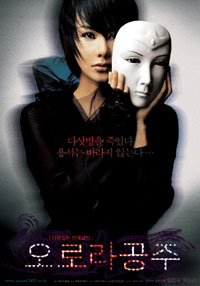 |
| Princess Aurora, with Eum Jeong-hwa. |
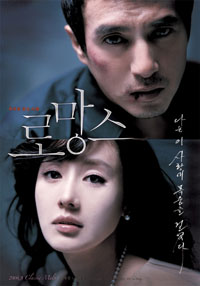 |
| Romance, with Cho Jae-hyeon (Bad Guy) and Kim Ji-su (This Charming Girl). |
As for more mainstream titles, there was Princess Aurora, Romance and All for Love. The latter, Nae Saeng-ae Gajang Areumdaun Iljuil, creates a net of characters, connected by a bit of light humour, romance and the unavoidable melodramatic bits towards the end. The mix works well, though we can imagine it could go further with the several resolutions. The script is well polished, not feeling too much contrived, due to interesting and sometimes funny characters. The relationships include a rough cop with an inhibited psychologist, a building's owner and the woman that manages a small coffee shop and an ex-basketball player with a little sick girl, which could be his daughter — something that is exploited by a reality TV show.
There's not much to say concerning Princess Aurora (Orora Gonju), starring Eum Jeong-hwa — also in All for Love. It's a thriller featuring a vengeful psychopath (whose identity is never a mystery), who leaves stickers of an animated character on crime scenes. We get to know the motivations, but the exposing of the reasons why each victim should be killed, shown in flashbacks, feels like afterthoughts. The film also seems to be indecisive on how to end, with a succession of three or four scenes which could precede the end credits. The way one of the last acts of revenge happens borders the absurd. There's no way the two characters would get together on the same place as displayed on the film.
Romance is another commercial film which failed to convince; much of what we see on screen doesn't seem possible to happen on the real world and the events walk towards a conclusion which trades honesty and logic for dramatic conveniences. The film tries too hard to be romantic and later goes straight into action film mode. We are reminded of the annoyed comments by Jeong Jae-yeong in «Someone Special», referring to certain Korean films which switch from intense drama for pure action with no apparent reason.
If You Were Me 3 is made of six short films under the human rights banner, focusing themes as racial discrimination, homosexuality, women's condition or labour issues. From the whole, only "GaP", by Lee Mi-yeon, felt too much "public service announcement". The remaining films were more successful sustaining stories without throwing the "message" to our face. Of course, this project is about that message, but we are supposed to appreciate it as fiction film notwithstanding its good intentions. Naturally, to make a good film it's not enought to be well-meaning.
More development is left for an eventual future opportunity. Brief synopsis:
“Muhammad the Hermit King”, Jeong Yun-chul. A Thai worker is victim of discrimination. The director adds an interesting fantasy element.
“The Girl Disappeared”, Kim Hyeon-pil. The hardships of an orphan high school girl living by herself.
“GaP”, Lee Mi-yeon. A couple discuss about what the male and female roles in the house/society should be. "You surely don't expect me to wash the dishes, right?!"
“A Rough Life”, No Dong-seok. Children react negatively to the presence of the black girl friend of the kid whose birthday they're celebrating. Takes a serious issue with some humour and the children are well directed.
“Bomb! Bomb! Bomb!”, Kim Gok and Kim Seon. A homosexual high school student is almost tortured to reveal who is his "new boyfriend".
“What Shall I Do?”, Hong Ki-seon. A worker with temporary contract has to deal with the limitations of his rights.
The directors and part of the cast from If You Were Me 3, after the screening.
The “Digital Short Films by Three Filmmakers” project, commissioned by the JIFF, had this year the motto "Talk to Her". It reunited the talent of directors Darezhan Omirbayev (Cazaquistan), Eric Khoo (Singapore) and Pen-ek Ratanaruang (Thailand).
The best of the three was No Day Off, by Khoo, about the issue of women that come from poor backgrounds, from countries like Indonesia, to work as maids in Singapore. This migration is a new phenomenon, a result of the recent economical growth in the country. Khoo frames only his central character during her period of work, keeping her bosses off-screen, something that at first might feel strange, but which ends working quite well. There's a concerning high number of cases of violence against maids in Singapore, which, according to the catalogue notes, are more close of being regarded as an electric appliance than as a living being.
After the end of the screening — with the presence of all directors — a young woman from Singapore said she didn't felt the film was being fair and resented the way it portrayed the situation fuelled on some cases that reached the press but which shouldn't reflect the reality. Khoo was up to the task of defending his work, saying he could chose to film one of the more violent cases of abuse made public, but he preferred to go for a slow routine with constant psychological aggressions during years than to opt for some of the shocking physical violence which was reported (examples were mentioned but they're not really necessary here).
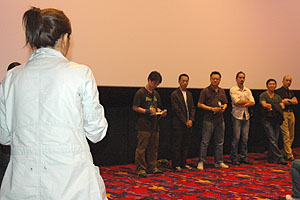 |
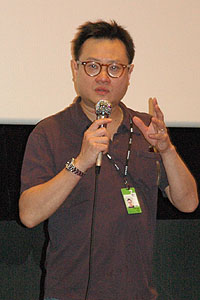 |
| A Singaporean woman not pleased with Eric Khoo's film, accused it of being unfair and too harsh. Besides Khoo (zoomable photo, right), the directors Pen-ek Ratanaruang and Darezhan Omirbayev also answered to audiences questions. |
Pen-ek Ratanaruang film, Twelve Twenty (12 hours and 20 minutes), the third short shown, is an interesting formal exercise, based on a story by Gabriel García Márquez, about a man that passes half a day side-by-side with a woman with whom he falls in love, during a plane trip between Thailand and Germany, without actually speaking to her. Christopher Doyle is the cinematographer and also plays the captain of the plane, who, for some reason, speaks in Mandarin (the flight attendant wore a sari and spoke French). The director refused any sort of explanation for things that happen or symbolism in the film, saying, somewhat modestly, it's just what it is and nothing more.
Adapted from a book by Anton Chekov, About Love is a plain story about two friends who meet after several years with no contact and one of them falls in love with the other one's wife. Distant and restrained like a classical play, it's the only one of the three films which didn't try to go for specific aesthetics or to get rid of the digital home video look.
22/06/06
(Continued)
« |
1 |
[ 2 ] |
3 |
4 |
»
|

